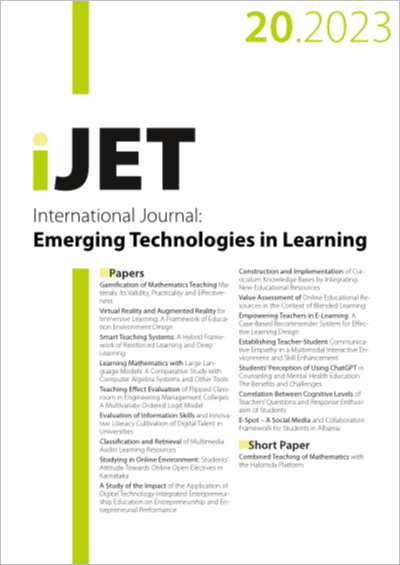Correlation Between Cognitive Levels of Teachers’ Questions and Response Enthusiasm of Students
DOI:
https://doi.org/10.3991/ijet.v18i20.44215Keywords:
teachers’ questions, cognitive levels, response enthusiasm of students; factor analysis, grey relational analysisAbstract
Teachers’ questions and students’ responses are important interactive links in the educational process. In recent years, with the deepening of research on educational psychology, more and more studies have begun to pay attention to the influence of cognitive levels of teachers’ questions on students’ responses. However, although some studies have shown that the way teachers ask questions has a significant impact on the learning outcomes of students, there is no clear answer to the precise relationship between cognitive levels of teachers’ questions and response enthusiasm of students. In addition, existing research methods often rely too much on descriptive statistics and lack a deep understanding and exploration of correlation. This study aimed to explore the correlation between cognitive levels of teachers’ questions and response enthusiasm of students. A new method was first introduced to measure the response enthusiasm of students. Taking English teaching as an example, an evaluation model was constructed through factor analysis, and the evaluation results were analyzed through Kaiser-Meyer-Olkin (KMO) test and Bartlett’s Test of Sphericity. Then grey relational analysis was used to measure the correlation between cognitive levels of teachers’ questions and response enthusiasm of students. The results revealed that cognitive levels had a significant impact on the response enthusiasm. The findings of this study not only provide teachers with an effective strategy to enhance the learning participation of students, but also bring new theoretical knowledge and practical experience to the field of educational psychology.
Downloads
Published
How to Cite
Issue
Section
License
Copyright (c) 2023 Nan Zhang, Ning Yang

This work is licensed under a Creative Commons Attribution 4.0 International License.



